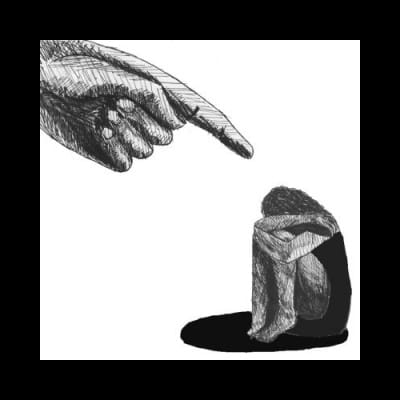The ugly face in the mirror

I turn to page 5 of The Daily Star on August 28 and see two news reports: one carrying the headline "Finalise rules of children act to deal with violence," and another, placed just above it, headlined "Arbitration provokes girl to commit suicide." The irony is immediately apparent.
The second report is about a child in Satkhira who killed herself after being subjected to humiliation for an alleged affair earlier this week. Rima, a ninth grader, was accused of having an "illicit affair" with her tutor by her neighbours at a local arbitration meeting. The next morning, she killed herself.
Bangladesh Manabadhikar Bastabayan Sangstha has recently reported 32 cases of children raped in the month of July alone. Some 336 children were raped and 48 gang-raped between January and July, according to a report by Bangladesh Shishu Adhikar Forum. Given the social context of Bangladesh, the numbers are probably an underestimation. Still, they illustrate just how pervasive rape has become in our society.
Maybe 15-year-old Rima will not be seen as a child by some, given the ambiguity that surrounds the legal age of consent. Maybe her suicide, after being accused of immoral behaviour, will not be seen as a crime perpetuated by society but rather something she did to herself.
Legal jargons are hard to follow, and drawing parallels between the legal system and our daily lives, for those who are not involved in activism or the legal system, may be difficult. I often think about the effectiveness of legal reforms—whether they are necessary, how they are necessary, etc. We tend to think of the law as separate from us. So I understand how it must be easy for most people, including myself, to miss any connection between moral policing, a social norm, and rising rape and sexual abuse, which has social dimensions but is also a criminal act. But how separate are legal and social dimensions, really?
In Bangladesh, we have a law in place that is a legacy of the colonial times—Section 155 (4) of the Evidence Act, 1872. This act enables evidence of the past sexual history of women and girls who are complainants in rape cases to be put in as evidence. At a recent consultation meeting organised by the Bangladesh Legal Aid and Services Trust, recommendations from a policy brief prepared on the impact of the continuing application of the law allowing use of character evidence of women and girls who are complainants in rape prosecutions, were shared. Among other things, what was reiterated was the horrific shaming and assault on character that a rape survivor must survive again in order to prove a crime that she not only did not commit, but was committed against her. I sat there and struggled to wrap my head around the fact that a law, so clearly sexist, still exists.
Exactly a week after I attended the meeting, I read the news about Rima. It is interesting that while both Rima and the tutor were accused of illegal sexual relations, only one of them committed suicide following the arbitration process. The girl. Who in this case is a minor, where the tutor, it is safe to assume, is an adult. If there must be a moral haggling, it is the adult who should be held accountable for engaging in immoral acts.
In hindsight, I shouldn't have been surprised. My education, social class, and upbringing allow me the privilege of throwing around words like "victim blaming" without having to explain what it really means, why it happens or what its consequences are. I hear the reason people blame a victim is to distance themselves from an unpleasant occurrence and thereby confirm their own invulnerability to the risk. By labelling or accusing the victim, others can see the victim as different from themselves. People reassure themselves by thinking, "Because I am not like her, because I do not do that, this would never happen to me." So I write it off as mostly a social problem. And of course, a form of moral policing, which we engage in to make ourselves feel better.
But moral policing, whether we realise it or not, has severe consequences. Sometimes it costs lives. And these consequences affect women and girls disproportionately because of the sense of entitlement society feels in regulating and policing a woman's body and sexuality. Unfortunately, for Bangladesh, this moral policing is not simply limited to being a social problem. It is supported by legal structures that were put in place hundreds of years ago and have rendered themselves irrelevant.
The reason we propagate the existence of a state-facilitated legal, political, economic system is that we assume they are fairer, more equal and more humane than the justice system offered by informal courts or local arbitration. However, given the existence of acts like the Evidence Act, one must wonder if that is the case at all? Are we enabling a judiciary system that perpetuates violence against women and girls in the same disproportionate manner that would be perpetuated in a local arbitration process? Why is there a necessity of exploring a rape survivor's sexual history in court?
In Rima's case, she was not raped. But we can only assume she must have been dehumanised and ill-treated to the point that she was forced to take her own life. Now, we must ask, had this not been a local arbitration process, had the case been brought to court, would she have been treated with any more respect?
The right of the defence to arraign the survivor's character and question her about her personal history is one of the most serious obstacles in achieving justice that should have no place in our legal system. But it does because there is a social system in place that justifies it.
There is a saying that "Law does not define society. It reflects society". The law serves as a mirror. So, how do we feel about the face that is staring back at us in the mirror?
Syeda Shagufe Hossain is the founder of Leaping Boundaries and a member of the editorial team at The Daily Star.





Comments